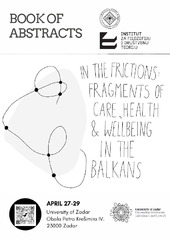Приказ основних података о документу
The Forgotten People. Roma in Serbia During the Covid-19 Crisis
| dc.creator | Đorđević, Ivan | |
| dc.date.accessioned | 2023-11-14T10:05:00Z | |
| dc.date.available | 2023-11-14T10:05:00Z | |
| dc.date.issued | 2023 | |
| dc.identifier.uri | https://dais.sanu.ac.rs/123456789/15501 | |
| dc.description.abstract | Roma are arguably one of the most vulnerable and discriminated communities in Europe, which is particularly the case in Central and South East Europe. Their status mostly derives from long-lasting discrimination and marginalization, which leads to extreme poverty, low educational status, unemployment and bad living conditions. Until recently, significant number of Roma didn't have access to the health care system due to their "invisible status" as a consequence of the lack of identification documents. In this presentation I will focus on the specific case of Roma living conditions in Serbia, particularly during the first year of the Covid-19 pandemic. The government measures such widely popular "lockdowns", limited access to health care etc., had a serious impact on many Serbian citizens. However, the most deteriorating effect of the Covid-19 related policies was on the most vulnerable population – Roma communities. Since most of them are involved in the "grey economy", depending on collecting and selling goods in the streets or in green markets, the impact of restricted mobility left them without a main source of income. Without social protection and security guaranteed by the state, they were left alone, depending only on occasional efforts made by centers for social work, humanitarian organizations and INGOs who had provided food and basic goods. Deriving from ethnographic data collected in various Roma settlements, in this presentation I will show the strategies of care developed within communities, facing not just the pandemic condition, but also structural constraints related to their accessibility to services available to other citizens in Serbia. | sr |
| dc.language.iso | en | sr |
| dc.publisher | Zadar : Sveučilište u Zadru i Institut za filozofiju i društvenu teoriju | sr |
| dc.relation | info:eu-repo/grantAgreement/MESTD/inst-2020/200173/RS// | sr |
| dc.rights | openAccess | sr |
| dc.rights.uri | https://creativecommons.org/licenses/by-sa/4.0/ | |
| dc.source | Book of abstracts: International conference In the Frictions: Fragments of Care, Health and Wellbeing in the Balkans, Zadar, April 27-29 2023. | sr |
| dc.subject | Roma | sr |
| dc.subject | Serbia | sr |
| dc.subject | Covid-19 pandemic | sr |
| dc.subject | poverty | sr |
| dc.subject | discrimination | sr |
| dc.title | The Forgotten People. Roma in Serbia During the Covid-19 Crisis | sr |
| dc.type | conferenceObject | sr |
| dc.rights.license | BY-SA | sr |
| dc.citation.spage | 23 | |
| dc.citation.epage | 23 | |
| dc.type.version | publishedVersion | sr |
| dc.identifier.fulltext | http://dais.sanu.ac.rs/bitstream/id/61819/Book-of-Abstracts-for-web-22042023-2.pdf | |
| dc.identifier.rcub | https://hdl.handle.net/21.15107/rcub_dais_15501 |

